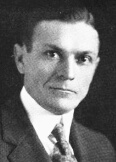Hewitt Bouanchaud
 From Conservapedia
From Conservapedia | Hewitt Leonidas Bouanchaud | |
 | |
Louisiana State Representative
for Pointe Coupée Parish | |
| In office 1904 – 1920 | |
| Preceded by | Two members:
William C. Carruth |
|---|---|
| Succeeded by | Two members:
Ferdinand L. Claiborne |
Speaker of the
Louisiana House of Representatives | |
| In office 1916 – 1920 | |
| Preceded by | Lee Emmett Thomas (Caddo Parish; former mayor of Shreveport) |
| Succeeded by | Richard Flournoy Walker (East Feliciana Parish) |
District Attorney for the
18th Judicial District | |
| In office 1929 – 1936 | |
| Preceded by | Jacob Haight Morrison, III |
| Born | August 18, 1877 Poydras Plantation New Roads, |
| Died | October 17, 1950 (aged 73) New Roads, Louisiana Resting place: |
| Political party | Democrat |
| Spouse(s) | (1) Emma Campbell Kearny Bouanchaud (married 1905-1914, her death)
(2) Eustatia Morrison Bouanchaud |
| Occupation | Attorney; Farmer |
| Religion | Roman Catholic |
Hewitt Leonidas Bouanchaud (August 19, 1877 – October 17, 1950) was a Democratic attorney and politician from one of the oldest families in New Roads in Pointe Coupée Parish, Louisiana, located north of the capital city of Baton Rouge. He was the Louisiana lieutenant governor from 1920 to 1924, at a time when that officer presided over the state Senate. Now the lieutenant governor, Billy Nungesser, is charged in the state constitution with the promotion of recreation and tourism.
Biography[edit]
Bouanchaud was born at Poydras Plantation, one of eight children of Joseph Alcide Bouanchaud, Sr. (1838-1896), and his second wife, the former Eugénia Helene Hébert (1853-1918). He graduated from Poydras Academy, Louisiana State University in Baton Rouge, and Tulane University in New Orleans, from which he obtained his LL.B. degree in 1902.[2] In 1908, he was elected as the state representative for Pointe Coupée Parish, at a time when each of the sixty-four parishes had at least one member elected to the state House. He was the House Speaker in his final term from 1916 to 1920.[3]
While lieutenant governor under Governor John Milliken Parker, Sr. (1863-1939), Bouanchaud was also elected as the president of the 1921 state constitutional convention, since updated into the current constitution in 1974. In 1924, rather than seeking reelection as lieutenant governor, Bouanchaud ran unsuccessfully for governor in the primary election but was defeated by Henry Luse Fuqua, Sr. (1865-1926) who died two years into his gubernatorial term. In 1929, with his state political career at an end and Huey Pierce Long, Jr. as governor, Bouanchaud was elected as district attorney for the 18th Judicial District in New Roads upon the death of Jacob Haight Morrison, III (1975-1929), the father of later New Orleans Mayor Chep Morrison, who had been DA for the preceding two decades. Bouanchaud left the DA's office in 1936, resumed his law practice, and engaged also in farming and cattle raising.[2][4]
From his first marriage in 1905 to the former Emma Campbell Kearney (1876-1914), Bouanchaud had three children. After Emma's death, he married in 1916 the former Eustatia Morrison (1891-1976) and had another child.[2] Bouanchaud is interred beside his second wife at St. Marys Cemetery in New Roads. The first wife is interred in the same cemetery.[1]
Because of its natural beauty and location, New Roads has been called "the Naples of Louisiana" and "the most ideally situated town in the United States."[5]
Mayor Joseph Lamartine Bouanchaud (1872-1951), an older brother of Hewitt Bouanchaud,[6] served at the turn of the 20th century and is credited with much of the progress made by New Roads.[5] Many Bouanchaud descendants still live in New Roads. James Madison Bouanchaud (1931-2020), a great-nephew of Hewitt Bouanchaud, was a civic figure and automobile dealer in New Roads, who branched out into Zachary in East Baton Rouge Parish and Gonzales in Ascension Parish.[7]
References[edit]
- ↑ 1.0 1.1 Hewitt Leonidas Bouanchaud. Findagrave.com. Retrieved on June 10, 2020.
- ↑ 2.0 2.1 2.2 Bouanchaud, Hewitt Leonidas. A Dictionary of Louisiana Biography: Louisiana Historical Association. Retrieved on June 10, 2020.
- ↑ Membership of the Louisiana House of Representatives, 1812-2024. Louisiana House of Representatives. Retrieved on June 10, 2020.
- ↑ A Dictionary of Louisiana Biography used the sources for its article on Bouanchaud: Alcée Fortier, ed., Louisiana, Vol. 3 (1914);Judy Riffel, ed., A History of Pointe Coupée Parish and Its Families (1983), and Dave H. Brown, A History of Who’s Who in Louisiana Politics in 1916 (1916).
- ↑ 5.0 5.1 "New Roads once likened as the Naples of Louisiana," The Pointe Coupee Banner, April 10, 1909.
- ↑ Joseph Lamartine Bouanchaud. Findagrave.com. Retrieved on June 10, 2020.
- ↑ James Madison Bouanchaud. The New Orleans Times-Picayune (June 7, 2020). Retrieved on June 10, 2020.
.
Categories: [Louisiana People] [Attorneys] [Farmers] [Politicians] [State Representatives] [Democrats] [Catholics] [Catholic Politicians]
↧ Download as ZWI file | Last modified: 02/16/2023 07:52:34 | 11 views
☰ Source: https://www.conservapedia.com/Hewitt_Bouanchaud | License: CC BY-SA 3.0
 ZWI signed:
ZWI signed: KSF
KSF